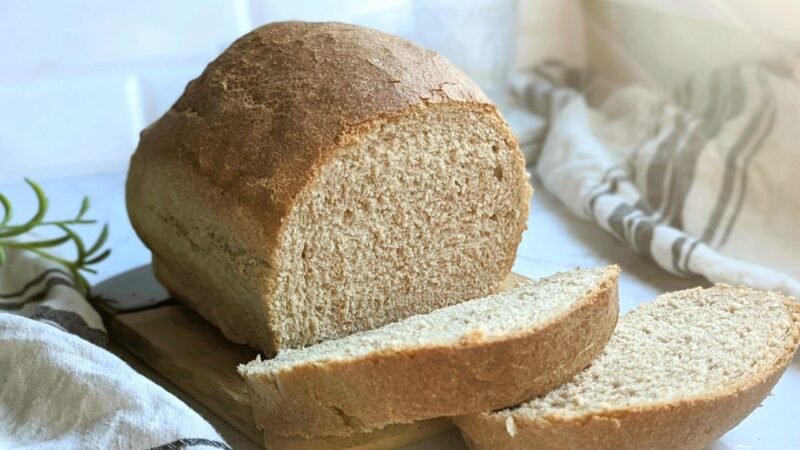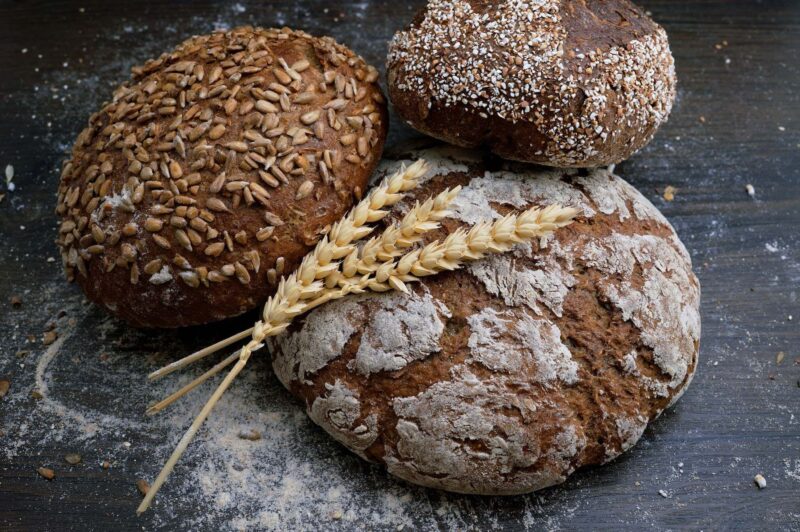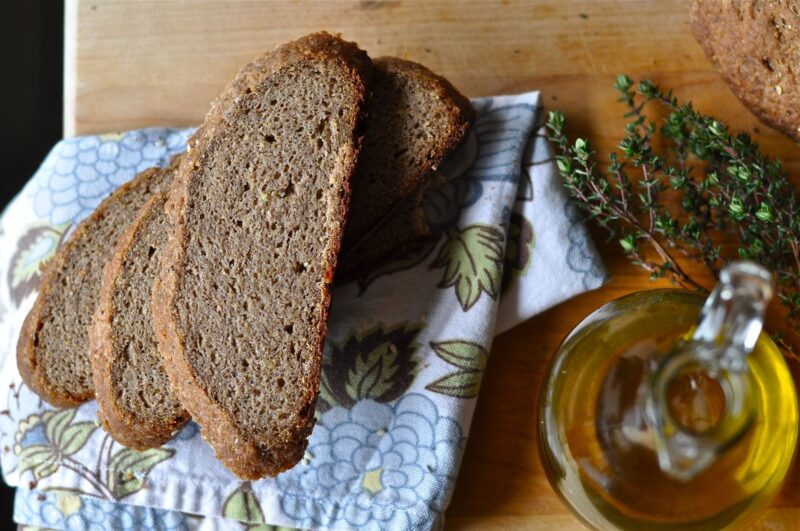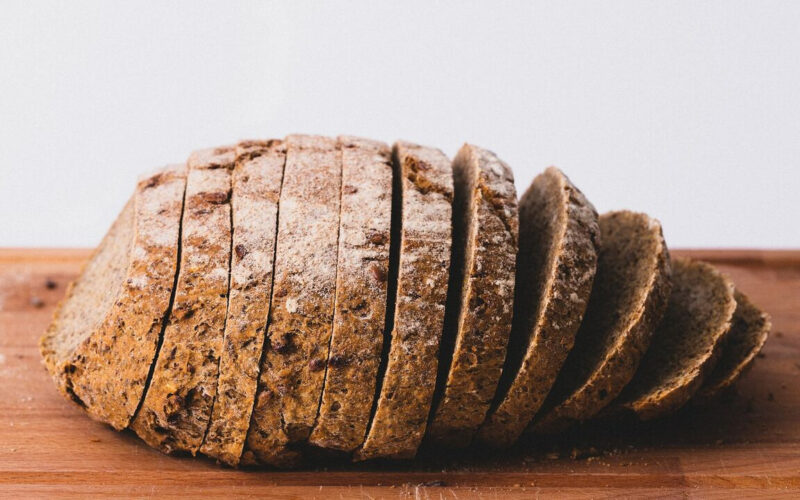The world of veganism has grown significantly in recent years, with more and more people opting for a plant-based diet. Many people wonder if vegans can eat bread, and the answer is yes. However, not all bread is vegan-friendly, as some may contain animal-derived ingredients such as eggs, milk, or honey.
Vegans need to read the ingredient list or labels to ensure the bread they choose is free from animal products. There are many vegan-friendly bread options available, including whole-grain bread, sourdough bread, and sprouted-grain bread.
Key Takeaways:

- Vegans can eat bread, but not all bread is vegan-friendly.
- Read ingredient lists to ensure bread is free from animal products.
- Vegan-friendly bread options include whole grain, sourdough, and sprouted grain bread.
- Check for ingredients such as eggs, milk, or honey to avoid non-vegan bread.
- Making homemade vegan bread allows for customization and control over ingredients.
Explore Plant-Based Alternatives
If you’re having difficulty finding vegan bread options in your local grocery store, consider exploring plant-based alternatives such as homemade bread or specialty vegan bakeries. Homemade bread allows you to have full control over the ingredients, ensuring that it is free from animal products. There are also vegan-friendly bread recipes available online that use simple, plant-based ingredients. Specialty vegan bakeries may offer a wider range of vegan bread options, including unique flavors and varieties.
By following these tips and being mindful of the ingredients and additives used in bread, vegans can confidently identify and enjoy delicious, cruelty-free bread options.
Health Benefits of Vegan Bread

Vegan bread, particularly whole-grain bread, offers a range of health benefits that make it a nutritious addition to a vegan diet. Whole grain bread is rich in fiber, which aids in digestion and promotes a healthy digestive system. Additionally, it provides essential nutrients such as vitamins and minerals, contributing to overall well-being.
One of the key health benefits of vegan bread, specifically whole grain bread, is its high fiber content. Fiber is essential for maintaining a healthy digestive system by promoting regular bowel movements and preventing constipation. It also helps control blood sugar levels, supports healthy weight management, and reduces the risk of certain chronic diseases like heart disease and type 2 diabetes.
In addition to fiber, vegan bread, especially whole-grain varieties, contains a range of essential nutrients. These include B vitamins, iron, magnesium, and zinc, which are vital for energy production, immune function, and cell growth and repair. These nutrients are often lacking in processed bread made with refined flour, making whole-grain vegan bread a healthier choice.
| Nutrient | Amount per serving |
|---|---|
| Fiber | 4 grams |
| Vitamin B2 (Riboflavin) | 10% of the Daily Value (DV) |
| Vitamin B3 (Niacin) | 10% of the DV |
| Iron | 8% of the DV |
| Magnesium | 8% of the DV |
| Zinc | 6% of the DV |
By choosing vegan bread made from whole grains, individuals can enjoy the health benefits of increased fiber intake, while also obtaining essential nutrients necessary for optimal health and well-being. Including vegan bread as part of a varied and balanced diet can support overall health and provide sustained energy throughout the day.
Vegan bread, particularly whole grain bread, offers a range of health benefits that make it a nutritious addition to a vegan diet.
Vegan-Friendly Bread Recipes
If you prefer to make your bread, there are plenty of vegan-friendly recipes available to try. Making homemade vegan bread allows you to control the ingredients and flavors, ensuring that it aligns with your dietary preferences.
One popular recipe is simple no-oil, no-sugar bread. This type of bread is perfect for those following a whole-food, plant-based diet. To make it, you’ll need ingredients like whole wheat flour, yeast, salt, and water. The absence of oil and sugar makes this bread a healthier option, while still providing a delicious, homemade taste.
Another option is homemade vegan sourdough bread. Sourdough bread is known for its tangy flavor and crisp crust. To make it vegan, you’ll need a sourdough starter, bread flour, water, and salt. The process of fermenting the dough with the sourdough starter gives the bread a unique flavor profile that is sure to impress.
Homemade vegan bread allows you to customize the ingredients and flavors to suit your preferences and dietary needs. Whether you’re looking for a no-oil, no-sugar option or a tangy sourdough bread, there’s a recipe out there for you.
Vegan No-Oil, No-Sugar Bread Recipe
| Ingredients | Instructions |
|---|---|
| 3 cups whole wheat flour | 1. In a large mixing bowl, combine the flour, yeast, and salt. |
| 2 1/4 teaspoons active dry yeast | 2. Gradually add the water to the flour mixture, stirring until a dough forms. |
| 1 teaspoon salt | 3. Knead the dough on a lightly floured surface for about 10 minutes, until smooth and elastic. |
| 1 1/4 cups warm water | 4. Place the dough in a greased bowl, cover it with a clean towel, and let it rise in a warm place for about 1 hour, or until doubled in size. |
| 5. Preheat the oven to 375°F (190°C). | |
| 6. Punch down the dough, shape it into a loaf, and place it in a greased loaf pan. | |
| 7. Bake the bread for 30-35 minutes, or until golden brown and sounds hollow when tapped on the bottom. | |
| 8. Remove the bread from the pan and let it cool on a wire rack before slicing. |
Vegan Sourdough Bread Recipe
| Ingredients | Instructions |
|---|---|
| 1 cup sourdough starter | 1. In a large mixing bowl, combine the sourdough starter, bread flour, water, and salt. |
| 3 cups bread flour | 2. Mix the ingredients until a shaggy dough forms. |
| 1 1/2 cups warm water | 3. Cover the bowl with a clean towel and let the dough rest for 30 minutes. |
| 2 teaspoons salt | 4. After the dough has rested, fold the dough over itself a few times to strengthen the gluten. |
| 5. Cover the bowl again and let the dough rise for 3-4 hours, or until doubled in size. | |
| 6. Preheat the oven to 450°F (230°C) and place a baking stone or tray inside to preheat as well. | |
| 7. Transfer the dough onto a well-floured surface and shape it into a round loaf. | |
| 8. Place the shaped dough on a piece of parchment paper and let it rise for another 30 minutes. | |
| 9. Just before baking, carefully transfer the dough with the parchment paper onto the preheated baking stone or tray. | |
| 10. Bake the bread for 30-35 minutes, or until golden brown and sounds hollow when tapped on the bottom. | |
| 11. Let the bread cool on a wire rack before slicing. |
Conclusion

In conclusion, enjoying bread on a vegan diet is possible. While vegans need to be aware that not all bread is vegan-friendly, there are a variety of options available to satisfy their carb cravings. By reading labels and avoiding ingredients derived from animals, vegans can find delicious and cruelty-free breads to incorporate into their plant-based lifestyle.
Whether it’s opting for whole grain bread, indulging in sourdough bread, or even making homemade vegan bread, there are plenty of choices to suit different tastes and dietary preferences. Whole grain breads offer health benefits such as fiber and essential nutrients, making them a nutritious choice for vegans.
For those who prefer a do-it-yourself approach, there are numerous vegan-friendly bread recipes available online. These recipes often use simple ingredients and can be customized to meet specific dietary needs, including no-oil and no-sugar options for those following a whole-food, plant-based diet.
So, if you’re a vegan wondering if you can enjoy bread, rest assured that there are plenty of vegan-friendly bread options out there. By being mindful of the ingredients and making informed choices, you can continue to relish bread as part of your plant-based lifestyle.
FAQ
Can vegans eat bread?
Yes, vegans can eat bread. However, not all bread is vegan-friendly. Some may contain animal-derived ingredients such as eggs, milk, or honey. Vegans need to read the ingredient list or labels to ensure the bread they choose is free from animal products.
What types of bread are vegan-friendly?
Vegan-friendly bread options include whole-grain bread, sourdough bread, and sprouted-grain bread. Whole grain breads are made from plant-based ingredients such as whole grains and seeds. Sourdough bread is made using a sourdough starter instead of commercial yeast. Sprouted grain bread is made from sprouted grains that have been ground into flour.
How can I identify vegan bread?
To identify vegan bread, read the labels carefully. Look out for any animal-derived ingredients such as eggs, dairy, honey, casein, whey, or ghee. Avoid bread that may be brushed with egg wash or milk before baking. By checking the ingredient list and avoiding these non-vegan ingredients, vegans can ensure they are choosing bread that is free from animal products.
What are the health benefits of vegan bread?
Vegan bread, especially whole-grain bread, offers several health benefits. Whole grain bread is high in fiber, aiding in digestion and maintaining a healthy digestive system. It is also a good source of essential nutrients, including vitamins and minerals.
Are there any vegan bread recipes available?
Absolutely! Many vegan-friendly bread recipes can be found online. These recipes often use simple ingredients such as flour, salt, yeast, and water. Some recipes even offer options for no-oil, no-sugar bread, perfect for those following a whole food, plant-based diet. By making their vegan bread, individuals can customize the ingredients and flavors to suit their preferences.

